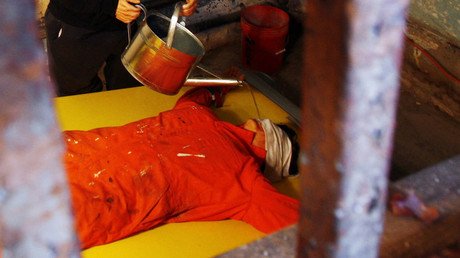CIA director says he ‘won’t bring back waterboarding’ even if ordered by future US president

Director of the CIA John Brennan, in a candid interview, has pledged never to bring back waterboarding – the practice classified in 2009 as torture – even if the future US president ordered it.
The practice has received condemnation ever since the release of the long-awaited CIA memo on torture, which revealed waterboarding to be in widespread use in the US War on Terror during the Bush Jr. administration. Presidential candidates have all been weighing in with their stances on it to appeal to their constituency (with the Republicans predictably being in favor).
CIA took nude photos of detainees before rendition to torture sites – reporthttps://t.co/XMdX3MBZ9opic.twitter.com/19RQOi8FSO
— RT America (@RT_America) March 29, 2016
But in an upcoming interview to be broadcast on NBC Monday night in the US, Brennan appears resolute.
"I will not agree to carry out some of these tactics and techniques I've heard bandied about because this institution needs to endure," he says.
According to the CIA report on torture, the waterboarding interrogation technique consists of a series of “near drownings” that leave suspects “completely unresponsive.” But all throughout the first decade of the 2000s, the technique was widely used by the United States and its allies in extracting information from Middle Eastern suspects and inmates in special prisons or secret facilities worldwide.
That waterboarding was cruel and ineffective was not an opinion shared by the former CIA Director Michael Hayden, who cited the opinion of three US attorneys-general.
Hayden’s view on waterboarding seemingly revolved around the person using it: if Syria’s Bashar Assad - it was torture; if the US, in pursuit of saving American lives - then not.
However, he did add that “if President Assad did it according to the rules the CIA used, if President Assad did it with medical personnel present… this is the CIA way,” in an interview to Al Jazeera a week ago.
“I’m not saying it’s torture. You’re not going to get me to say it’s torture,” Hayden also said.
The presidential race is heating up. Republican hopeful Donald Trump says he’d bring back “a hell of a lot worse” in the pursuit of extracting information from terrorist suspects. Other candidates are taking a notably softer stance, though Ted Cruz of Texas wouldn’t be above using it as well.
Previously, the CIA director stood in favor of the technique. After the release of the torture report in December 2014, a year after he took office, Brennan defended the practice:
“Our reviews indicate that the detention and interrogation program produced useful intelligence that helped the United States thwart attack plans, capture terrorists and save lives.”
He did add he was uncertain if such techniques were better or worse than more humane approaches.













